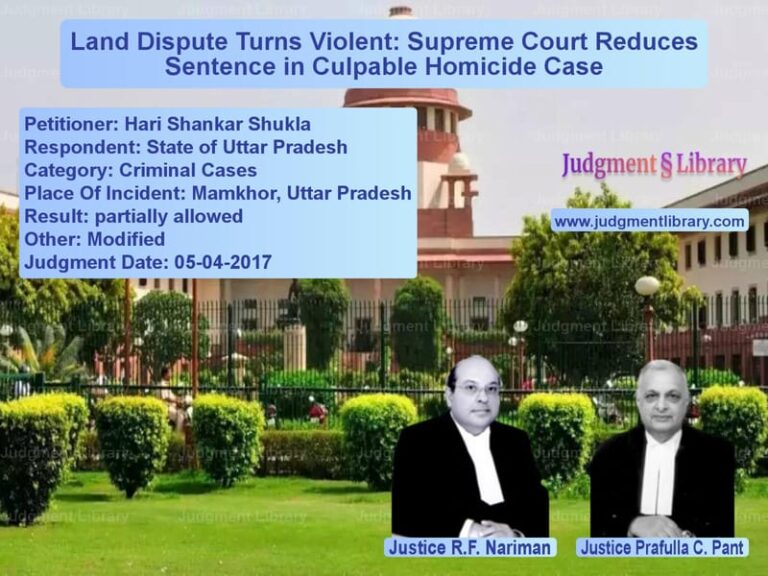Supreme Court Upholds Police Authority’s Discretion in Recruitment Case
The Supreme Court of India, in the case of Imtiyaz Ahmad Malla vs. The State of Jammu and Kashmir & Ors., upheld the decision of the Jammu and Kashmir Police to deny reinstatement to a recruit who had been acquitted in a criminal case. The judgment emphasized that mere acquittal does not automatically entitle a candidate to reinstatement in a disciplined force like the police.
Background of the Case
The petitioner, Imtiyaz Ahmad Malla, had applied for the post of constable in the Jammu and Kashmir Executive Police and was selected in 2009. However, his appointment was later canceled when a background check revealed his involvement in a criminal case registered as FIR No. 52/2007 under Section 379 of the Ranbir Penal Code and Section 6 of the Forest Act.
Though the petitioner was acquitted in 2011, the police authorities refused to reinstate him, citing concerns over his suitability for the force. He challenged this decision in the High Court, which upheld the authorities’ discretion in recruitment decisions. The petitioner then appealed to the Supreme Court.
Arguments by the Petitioner
The petitioner’s counsel contended that:
“Since the petitioner was acquitted, he should be treated as having no criminal record and should be reinstated into the police force.”
- The criminal case was based on weak evidence, and the prosecution failed to prove the charges.
- The authorities unfairly denied him reinstatement despite his acquittal.
- Other similarly placed candidates were reinstated, and the refusal to reinstate him was discriminatory.
Arguments by the Respondents (State of Jammu and Kashmir)
The State, represented by its counsel, opposed the petition, arguing:
“The Director General of Police has the discretion to determine the suitability of candidates for the police force. An acquittal does not erase concerns about integrity and discipline.”
Additional arguments included:
- The petitioner had misrepresented his residential address to avoid detection during police verification.
- The acquittal was not an honorable acquittal but was based on benefit of the doubt.
- The police force requires high moral and ethical standards, and allowing individuals with questionable backgrounds would compromise its integrity.
Supreme Court’s Observations
The Supreme Court cited the Constitution Bench ruling in Avtar Singh vs. Union of India (2016), which held that mere acquittal does not entitle a candidate to automatic reinstatement. The Court emphasized:
“A person having criminal antecedents, even if acquitted, may still not be suitable for a disciplined force like the police.”
Key observations included:
- The Screening Committee’s decision regarding a candidate’s suitability is final unless proven to be arbitrary or mala fide.
- Honorable acquittal, meaning a complete exoneration from blame, is different from an acquittal due to lack of evidence.
- The police force requires individuals with impeccable character, and authorities have a duty to maintain public confidence.
Final Judgment
The Supreme Court ruled:
- The rejection of the petitioner’s reinstatement was valid and justified.
- The decision of the Director General of Police was within the bounds of discretion granted to police authorities.
- The petitioner’s past criminal case, even with an acquittal, raised sufficient concerns about his suitability for the force.
- The High Court’s decision was upheld, and the appeal was dismissed.
Implications of the Judgment
This ruling has significant implications for recruitment in disciplined forces:
- Acquittal Does Not Guarantee Reinstatement: An acquittal in a criminal case does not automatically entitle a candidate to a job in law enforcement.
- Higher Standards for Police Personnel: Police officers must maintain integrity and moral character, and recruitment decisions must reflect this.
- Discretion of Screening Committees: Authorities have the right to assess suitability beyond the technical outcome of a criminal case.
Conclusion
The Supreme Court’s ruling in Imtiyaz Ahmad Malla vs. The State of Jammu and Kashmir & Ors. underscores the importance of maintaining high ethical standards in law enforcement. By upholding the police department’s discretion, the judgment reinforces the principle that recruitment decisions should be based not just on legal technicalities but also on considerations of integrity and public trust.
Petitioner Name: Imtiyaz Ahmad Malla.Respondent Name: The State of Jammu and Kashmir & Ors..Judgment By: Justice Ajay Rastogi, Justice Bela M. Trivedi.Place Of Incident: Jammu and Kashmir.Judgment Date: 28-02-2023.
Don’t miss out on the full details! Download the complete judgment in PDF format below and gain valuable insights instantly!
Download Judgment: imtiyaz-ahmad-malla-vs-the-state-of-jammu-a-supreme-court-of-india-judgment-dated-28-02-2023.pdf
Directly Download Judgment: Directly download this Judgment
See all petitions in Termination Cases
See all petitions in Public Sector Employees
See all petitions in Recruitment Policies
See all petitions in Judgment by Ajay Rastogi
See all petitions in Judgment by Bela M. Trivedi
See all petitions in dismissed
See all petitions in supreme court of India judgments February 2023
See all petitions in 2023 judgments
See all posts in Service Matters Category
See all allowed petitions in Service Matters Category
See all Dismissed petitions in Service Matters Category
See all partially allowed petitions in Service Matters Category







